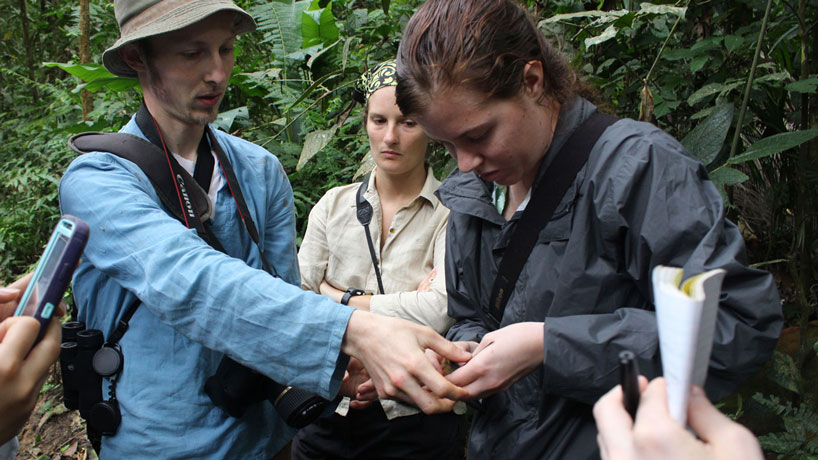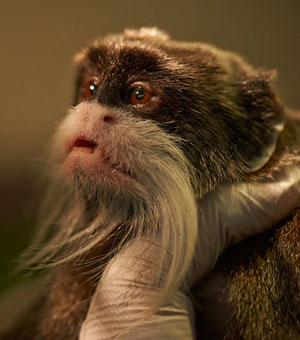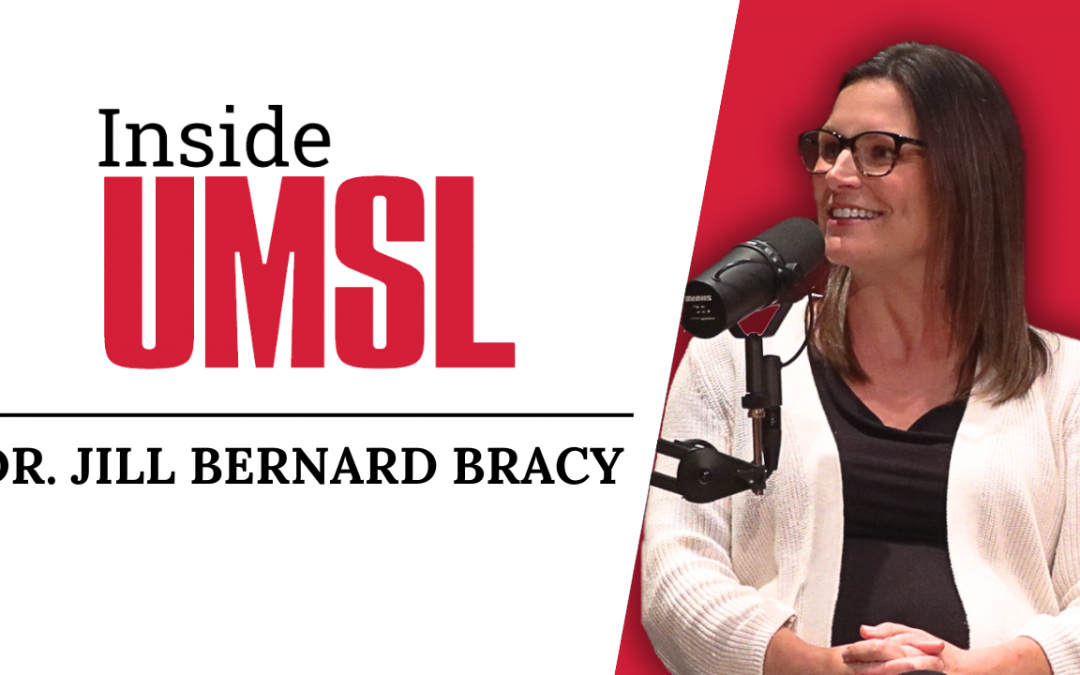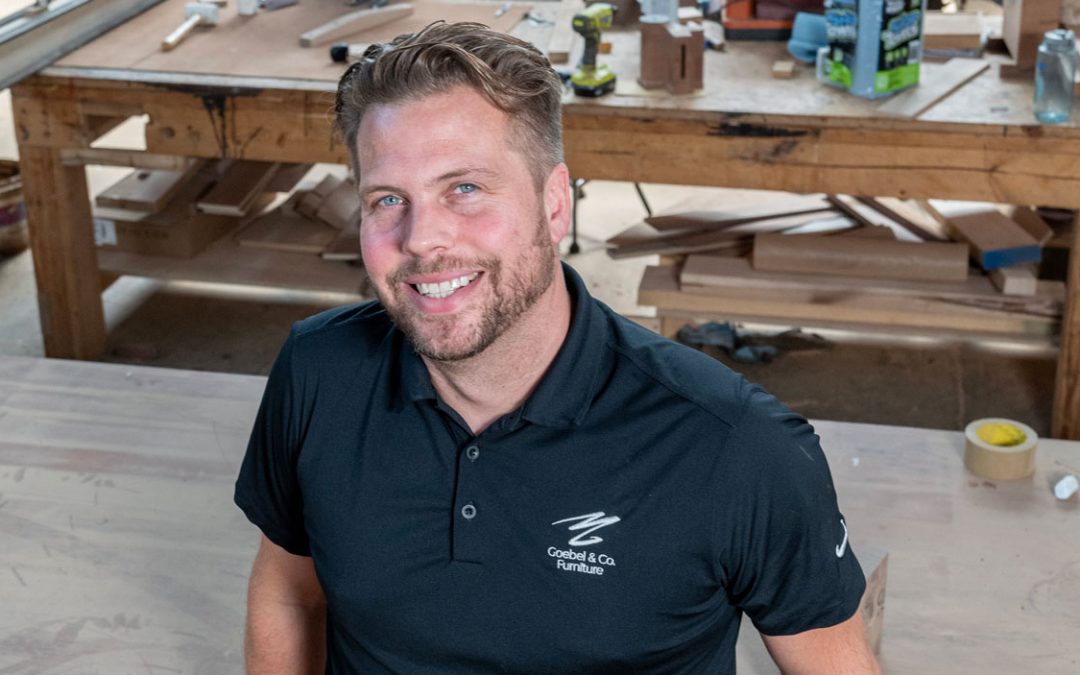
Biology doctoral student Gideon Erkenswick (left) teaches research assistants about Amazon wildlife, specifically primates in Peru, through the nonprofit he co-founded and now directs, Field Projects International. (Photo provided by FPI)
Gideon Erkenswick lived in the Amazon for a year. He did so to help his wife, Mrinalini Watsa, habituate a population of primates to a large-scale capture and release program for field research in Peru. What started out as graduate work grew into Field Projects International, an organization that gets students engaged in science outside the lab.
FPI provides university students worldwide the opportunity to gain field experience through nontraditional learning, research and protection of threatened habitats. For Erkenswick, it’s work all done in addition to his doctoral research in biology at the University of Missouri–St. Louis.
“I study parasite-host relationships,” said Erkenswick whose area of emphasis is in ecology, evolution and systematics. His involvement in his wife’s primate field research inspired his pursuit of a doctorate.
“So I put the two together [parasite-host relationships and primates],” he said. “It is a golden opportunity. I have this incredible population with access to data that is not typical, and we really only have glimpses of what South American primates carry. There aren’t a lot of comprehensive studies on them and certainly not of the detail at which I want to study the population – year after year, at the level of the individual. I can look at one individual for four years and see all the things he’s encountered, all the things the population’s gotten rid of and potentially figure out why.”
The two primate species his research focuses on are the Saddleback Tamarin and the Emperor Tamarin, although additional samples provide complimentary data on the other nine primate species at the field site. The parasites he studies are blood parasites and gastrointestinal parasites.
Erkenswick signs up undergraduates and recent graduates to help with research every summer.
“When we tell you you’re going to come and learn how to track animals, you really are, because we have animals running around the Amazon with radio collars on,” he said. “It’s not fake. You’re going to do it. We also teach you to climb emergent trees and how to setup a grid of motion-sensing camera trap equipment on trails.”
He loves how the field experience inspires students to pursue science research.
“It’s not like in a classroom where you feel good that you’ve explained a difficult concept to them. They go there, and it’s a life-changing experience. They’re like, ‘I can do this. I would love doing this.’ And they go and they do. It’s a short amount of time that you spend with students, but the impact is huge.”
Many of their students have gone on to doctoral programs, veterinary school, the national park service and fieldwork with other nonprofits.
Besides research, students also have the option to take field courses – a chance to get involved without committing to the four or more weeks that research demands. Classes include tropical biology, primatology and a new course on wildlife cinematography this year, taught by a BBC cinematographer.
“We’re very excited, because most of the world can only connect to places like this through documentaries,” Erkenswick said.
Scholarships are available for students who apply to the program. Even better news: Erkenswick and Watsa welcome students without prior field experience.
“Our goal is to get more people science literate and to care about places that are threatened. If you only bother to explain things to people who have prior exposure and experience, then you aren’t really achieving that goal.”
FPI practices conservation by maintaining a field site. Illegal miners and foresters are deterred by the regular presence of field researchers. Also, the research itself can discover things about the forest and wildlife that help private landowners and environmentalist organizations justify the continued conservation of the land, Erkenswick said.
FPI originally started out as PrimatesPeru in 2009 but underwent a name change this year to reflect expansion. A new field site in South India is being established. The organization, which incorporated in 2013, works closely with the Whitney R. Harris World Ecology Center at UMSL, which hopes to provide scholarships to UMSL students in the future. The Harris Center also partially supported Erkenswick’s research on primates in Peru.
April 17 is the deadline to apply for field research. Check the website for application deadlines for field courses.
Erkenswick plans on graduating in the fall of 2016. He also plans on continuing FPI, whether he works with the organization full time or not.
For now, you’ll find him taking advantage of field season with his backpack, notebook, binoculars, GPS, water and cookies.
“You always have to have cookies. That’s how you get through the day.”
















